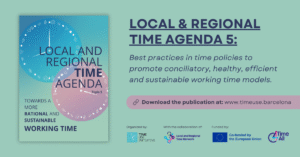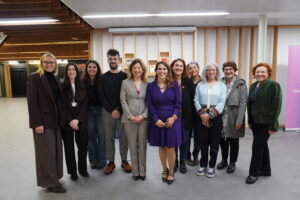- The Time Use Initiative (TUI) welcomes the Spanish Government’s announcement to support the elimination of the annual clock change from 2026 and to propose this goal to the Council of the European Union, the body responsible for its final approval.
- The TUI believes that this momentum could reignite a European debate that has been stalled since 2021, putting on the European agenda a citizen demand supported by 80% of Europeans and backed by scientific evidence proving the negative impact on health, the economy and the environment.
- In line with scientific evidence and the proposal by the International Alliance for Natural Time (IANT) and the TUI to maintain a more natural solar time (known as winter time or standard time), the organisation recommends promoting a European campaign to spread awareness of the benefits of this time, warning that the permanent adoption of summer time or DST would have negative effects on sectors such as agriculture, livestock farming and construction.
The Time Use Initiative (TUI) welcomes the Spanish Government’s announcement to support the elimination of the annual clock change from 2026 and to propose this goal to the Council of the European Union, the body that must ultimately approve it.
The TUI welcomes the fact that the European Commission has expressed its support for President Pedro Sánchez’s proposal to eliminate the seasonal clock change by 2026. Energy Commissioner Dan Jorgensen stated that the Commission will collaborate to reach a common position among member states and foster consensus within the European Union. While acknowledging that it is not a central issue on the European agenda, Jorgensen stressed that it is a demand shared by millions of citizens.
The TUI also welcomes the fact that the European Parliament will once again debate this issue in plenary on Thursday, September 23. “The fact that states are talking about it, that the European Commission and the European Parliament are also doing so, makes the debate take on greater importance,” says Marta Junqué, director of the TUI.
“This debate has been going on for years. After the failed attempt to get Europe to approve it in 2021, in recent years, the only ones who placed this issue on the European agenda were civil society and some members of the European Parliament. Therefore, we hope that the Spanish government’s proposal will be a catalyst to bring this debate back on the European agenda and close it once and for all,” Junqué added.
The main reasons for putting an end to the time change are that it is a demand supported by 80% of Europeans; that there is no evidence to support claims of energy savings– the main reason why it was introduced – and that, conversely, it has serious impacts on health and, consequently, on the economy.
A recent study by Stanford University shows that the biannual clock change is the worst-case scenario for health, as it disrupts circadian rhythms – weakening the internal clock – thereby increasing the risk of obesity and strokes. Using a mathematical model, the researchers conclude that maintaining a fixed schedule is healthier, with natural or solar time being the most beneficial. According to their estimates, adopting this schedule could prevent up to 300,000 cases of stroke each year and reduce the number of people with obesity by 2.6 million in the case of the United States.
In line with scientific evidence and the position of the International Alliance for Natural Time (IANT) and the TUI, the organisation recommends that the European Commission launch a campaign to explain the benefits of maintaining a more natural solar time, with more hours of daylight in the morning than in the evening, known as winter time or standard time. “We have to stop asking the population if they prefer summer or winter time, because it is a misleading question. Due to the tilt of the Earth, there will always be more hours of sunlight in summer than in winter. What we have to ask is at what time we want to have more sunlight: in the morning or in the evening?”, explains Junqué.
“If we stayed permanently in daylight saving time, between the months of December and March, in Barcelona the sun would rise at 9.15 am. This would mean that we would go to school in the dark and that economic activities such as agriculture, livestock or construction could not be carried out,” concludes Junqué.
Resources:






